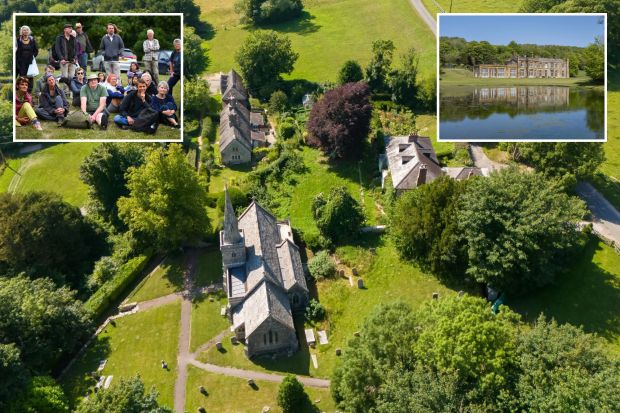Residents of Littlebredy, a picturesque village in Dorset made famous by the ITV drama “Broadchurch,” are expressing their outrage against “faceless developers” who they claim are transforming their beloved community for the worse. The village, known for its serene landscapes and historic charm, has become the center of a heated dispute following the sale of the Bridehead Estate.
The Bridehead Estate, a sprawling 2,047-acre property, was previously owned by Sir Philip and Lady Catherine Williams, whose family had resided there for generations. The couple was well-regarded by locals for allowing public access to the estate’s scenic grounds, including a lake and waterfall featured in “Broadchurch.” However, the influx of fans visiting the site led to the sale of the estate to Belport Ltd, an investment company based in Oxfordshire.
Community Uproar Over Land Access
Belport Ltd’s acquisition of the estate has sparked significant unrest among Littlebredy residents. The company has closed public access to popular areas of the estate, citing health and safety concerns. This decision has been met with skepticism and anger from the community, who view it as an unjustified restriction on their long-standing rights.
Russell Giles, a protester from Dorchester, voiced the sentiments of many locals, stating,
“They are taking away land that’s been used by the public for 65 years. It feels so heavy-headed and unnecessary, a faceless corporation taking over. The idea that they are doing it for health and safety is ludicrous.”
In response to these developments, around 70 campaigners participated in a Right to Roam protest, scaling estate walls to demonstrate their opposition. The protest included a picnic by the waterfall and poetry readings, symbolizing the community’s determination to reclaim their access to nature.
Impact on Local Residents
The changes have had a profound impact on the lives of Littlebredy residents. Christine McFadden, a well-known cookery writer and long-time resident, was forced to leave her home after her tenancy was not renewed. Her former residence has since been converted into an office for the estate’s new management.
McFadden lamented,
“I lived in Littlebredy for 21 years and absolutely loved it. But now it is totally different.”
Her sentiment is echoed by many in the village, who fear displacement due to potential rent increases and short-term tenancy agreements.
Developers’ Perspective and Future Plans
Belport Ltd has defended its actions, asserting that the estate’s upgrades are necessary to meet modern energy and safety standards. The company has stated that it has no intention of evicting residents and aims to improve the estate’s properties through ongoing investment.
In a statement, Belport explained,
“Having bought the Bridehead estate, our principal focus is to orchestrate a sequence of upgrade works to each of the estate properties in Littlebredy, which will bring them up to current and anticipated minimum energy and safety standards required of all landlords.”
The company has also indicated that public access to the waterfall and lake may be restored if safety issues can be adequately addressed. However, many residents remain skeptical of these assurances, fearing that the changes signal the end of an era for their community.
Looking Ahead
The situation in Littlebredy highlights the broader tensions between development interests and community preservation. As the village grapples with these changes, residents continue to advocate for their rights and the preservation of their cultural heritage. The outcome of this dispute may set a precedent for similar communities facing the pressures of modern development.
As Littlebredy residents await further developments, the village stands at a crossroads, caught between the allure of modernization and the desire to maintain its historical identity.
 Post Office Scandal: Inquiry Reveals Systemic Failures and Calls for Justice
Post Office Scandal: Inquiry Reveals Systemic Failures and Calls for Justice Cattle Markets React as U.S. Reopens Border with Mexico
Cattle Markets React as U.S. Reopens Border with Mexico Court Rejects Johnson & Johnson’s 340B Drug Discount Rebate Plan
Court Rejects Johnson & Johnson’s 340B Drug Discount Rebate Plan Max McBrayer Appointed CEO of NATSO, Leading the Future of Truck Stops
Max McBrayer Appointed CEO of NATSO, Leading the Future of Truck Stops Reolink Launches Early Prime Day Deals for Enhanced Home Security
Reolink Launches Early Prime Day Deals for Enhanced Home Security